Spacecraft
A spacecraft is a vehicle designed for travel or operation in outer space. It can be manned or unmanned and can be used for various purposes, including scientific research, communication, navigation, and exploration.
Types of Spacecraft
There are several types of spacecraft, including:
- Satellites: Satellites are unmanned spacecraft that orbit the Earth or other celestial bodies. They can be used for communication, weather monitoring, navigation, and scientific research.
- Rovers: Rovers are robotic spacecraft that are designed to move across the surface of a planet or other celestial body. They are equipped with instruments to conduct scientific experiments and gather data.
- Space Probes: Space probes are unmanned spacecraft that are designed to travel through space and explore distant planets, moons, and other objects in the solar system. They often carry scientific instruments to study the celestial bodies they encounter.
- Space Shuttles: Space shuttles are reusable spacecraft that can transport astronauts and cargo to and from space. They have been used for missions such as deploying satellites, conducting scientific research, and assembling space stations.
Components of a Spacecraft
A typical spacecraft consists of several key components, including:
- Propulsion System: The propulsion system provides the spacecraft with the necessary thrust to travel through space. It can be powered by chemical rockets, ion thrusters, or other propulsion technologies.
- Communication System: The communication system allows the spacecraft to transmit and receive data, commands, and signals to and from Earth or other spacecraft.
- Power Source: Spacecraft are typically equipped with solar panels, nuclear reactors, or batteries to provide the necessary power for their operations.
- Instrumentation and Payload: Spacecraft carry various scientific instruments and payloads to conduct experiments, gather data, and perform specific tasks related to their mission objectives.
- Life Support Systems (for manned spacecraft): Manned spacecraft are equipped with life support systems to provide astronauts with air, water, food, and other essentials needed for survival in space.
Study Guide
To study the topic of spacecraft, consider the following key points:
- Understand the different types of spacecraft and their respective purposes.
- Learn about the components of a spacecraft and how they contribute to its functionality.
- Explore the history of space exploration and the major milestones achieved through the use of spacecraft.
- Study the advancements in propulsion technologies and their impact on spacecraft design and capabilities.
- Examine the challenges and risks associated with space travel and the measures taken to ensure the safety and success of spacecraft missions.
By mastering these concepts, you will gain a comprehensive understanding of spacecraft and their significance in the exploration and study of outer space.
.◂Earth Science Worksheets and Study Guides High School. Earth's Crust
Worksheet/Answer key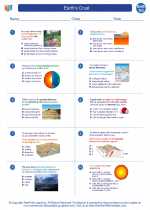 Earths Crust
Earths Crust  Worksheet/Answer key
Worksheet/Answer key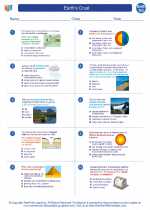 Earths Crust
Earths Crust  Worksheet/Answer key
Worksheet/Answer key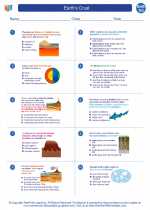 Earths Crust
Earths Crust  Vocabulary/Answer key
Vocabulary/Answer key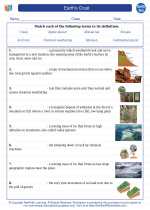 Earths Crust
Earths Crust  Vocabulary/Answer key
Vocabulary/Answer key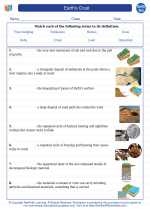 Earths Crust
Earths Crust  Vocabulary/Answer key
Vocabulary/Answer key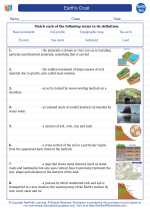 Earths Crust
Earths Crust 

 Worksheet/Answer key
Worksheet/Answer key
 Worksheet/Answer key
Worksheet/Answer key
 Vocabulary/Answer key
Vocabulary/Answer key
 Vocabulary/Answer key
Vocabulary/Answer key
 Vocabulary/Answer key
Vocabulary/Answer key

The resources above cover the following skills:
Earth Science
History of Earth
Develop a model to illustrate how Earth’s internal and surface processes operate at different spatial and temporal scales to form continental and ocean-floor features.
Earth Science
History of Earth
Develop a model to illustrate how Earth’s internal and surface processes operate at different spatial and temporal scales to form continental and ocean-floor features.
Earth Science
History of Earth
Develop a model to illustrate how Earth’s internal and surface processes operate at different spatial and temporal scales to form continental and ocean-floor features.
Earth Science
History of Earth
Develop a model to illustrate how Earth’s internal and surface processes operate at different spatial and temporal scales to form continental and ocean-floor features.